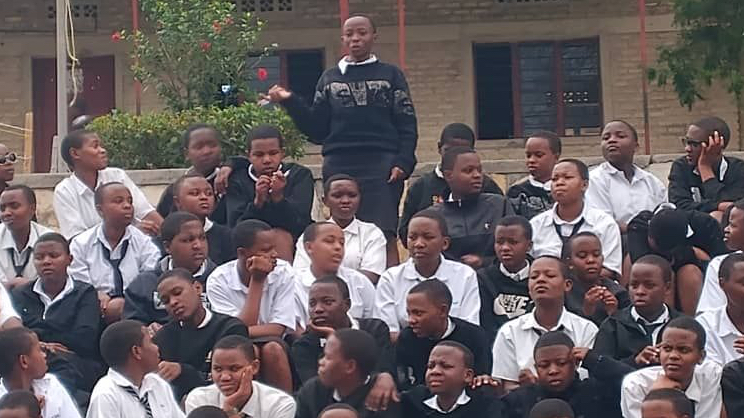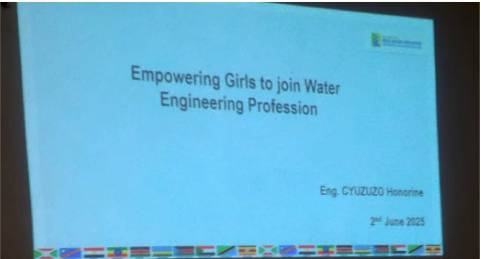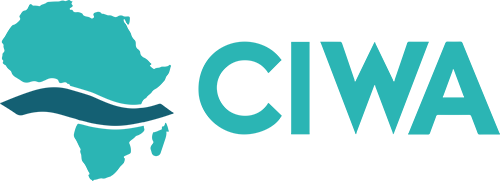Inspiring Rwandan girls to transform water challenges into careers
Posted in : Blog on 22 November 2025

In early June 2025, a unique outreach campaign began making waves in Rwanda’s secondary schools. Titled “Empowering Girls to Join the Water Engineering Profession,” this campaign was more than just a school visit; it was a deliberate intervention aimed at shifting mindsets, opening doors, and planting seeds of ambition in classrooms often left on the margins of technical career paths.
Led by the Nile Equatorial Lakes Subsidiary Action Program Coordination Unit (NELSAP-CU), this initiative, funded by The World Bank’s Cooperation in International Waters in Africa program—CIWA through the NCCR project, reached students in four schools across Rwanda, including Bright Academy in Nyagatare, Gahini Fawe Girls School in Kayonza, College De Bethel in Ruhango, and Wisdom School in Musanze. This campaign will continue in schools in Rwanda and be replicated in all NBI centers.
Engineering her future: A Campaign for NELSAP-CU
In each of these classrooms, girls gathered to learn not only about the basics of water and its importance to life but also about what it means to be a water engineer. They discovered that engineering is not just about machines or construction sites; it’s also about solving real-world problems like access to clean water, climate resilience, and sustainable urban growth. They were introduced to global water challenges, the science behind water resource management, and the critical role that engineers play in safeguarding this most essential of natural resources. Most importantly, they were shown that girls like them have a place in this profession, and a future in water engineering is both possible and needed.
The timing of this campaign could not have been more urgent. Across Africa, and especially within the Nile Basin countries, women remain severely underrepresented in science, technology, engineering, and mathematics (STEM) fields. According to recent UNESCO data, women make up just 22% of STEM graduates in Africa. This campaign aims to change that by inspiring girls to pursue careers in water engineering and demonstrating that they have the skills and knowledge to succeed in this field.
Engineering graduates in SubSaharan Africa constitute 28 percent. In water engineering, where technical knowledge intersects with environmental stewardship, the gap is even wider. In Rwanda, national statistics reveal that only about 15 percent of university engineering students are female. While progress has been made in improving girls’ access to education, traditional gender roles, limited mentorship opportunities, and a lack of exposure to technical careers still hinder many girls from pursuing STEM-related futures.
This campaign aimed to disrupt this cycle. At College De Bethel alone, over 700 students participated in campaign activities. In Musanze’s Wisdom School, 72 girls joined the sessions. Across all four schools, students engaged in dynamic presentations with facilitators that demystified the engineering profession and provided tangible pathways for exploration, including scholarships, mentorship programs, fieldwork, and university programs.
One of the campaign’s most powerful elements was the inclusion of stories from successful women engineers working in water and environmental sectors. These personal testimonies, delivered in person or through multimedia, helped students visualize themselves in the field and perceive success as achievable.
Changing the narrative, one classroom at a time
The response from students was overwhelmingly positive. Many expressed surprise at learning about water engineering for the first time. Some had never met or even imagined a woman in such a role. Teachers and school administrators observed an immediate shift in student attitudes from cautious curiosity to confident inquiry. Girls who had previously leaned toward traditionally “safe” professions began asking about engineering schools, internship opportunities, and subjects to focus on for a career in water science. Stereotypes about engineering being “for boys” began to fade, replaced by a more inclusive understanding.

In empowering girls to step into roles they were never told were theirs, NELSAP-CU is doing
more than delivering presentations.
The campaign generated critical insights beyond the classroom sessions, revealing what’s needed to sustain and scale this momentum. Many students expressed a lack of access to information about STEM careers, particularly water engineering. Others emphasized the importance of mentorship and continued support throughout their academic journeys. As a result, NELSAP-CU is now recommending several follow-up actions, including establishing school-based mentorship programs, creating STEM and career guidance clubs, organizing field visits to water engineering sites, and engaging parents and communities in supporting girls’ education in technical fields.
While the campaign focused on Rwanda as a pilot, its implications extend to the entire Nile Equatorial Lakes region, spanning Burundi, Uganda, Tanzania, Kenya, South Sudan, and Rwanda. This region faces mounting water-related challenges, including seasonal droughts, flooding, infrastructure gaps, and rapid urbanization. The demand for skilled water engineers is growing, but the talent pipeline remains constrained, particularly among women. By empowering girls to enter the water engineering profession, the region not only addresses a gender gap but also strengthens its human capital to respond to climate and development pressures.
This initiative comes at a time when the global conversation around water, equity, and sustainable development is intensifying. Girls inspired today could become engineers, policymakers, and innovators who design tomorrow’s water systems that are more inclusive, adaptive, and resilient. Although the campaign may have reached only four schools this time, its message is expansive: there is space for girls in engineering, and there is an urgent need for their voices, ideas, and leadership in shaping the future of water management across the Nile Basin and beyond.
Originally published in the NELSAP-CU Newsletter, September 2025 Edition


